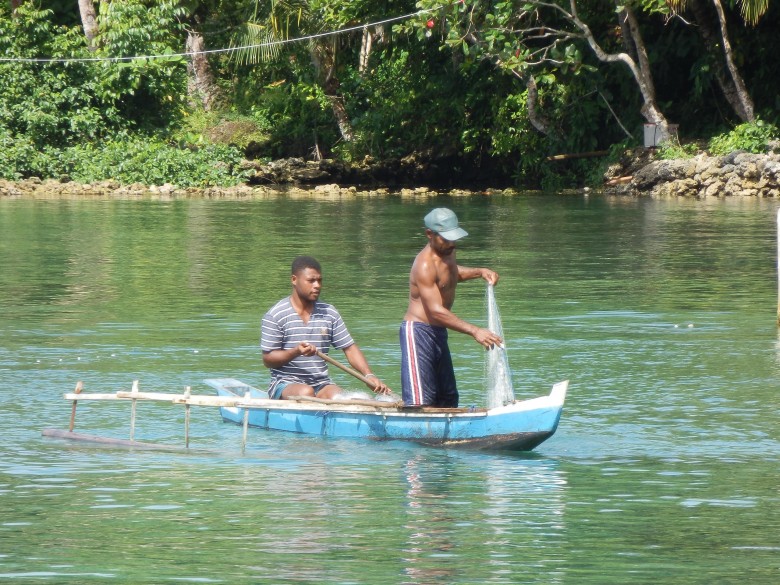
Fishers in Indonesia using cast nets to catch bait for a day’s fishing. Photo: Peter Mumby
More marine protected areas in the Coral Triangle will feed more, conserve species
January 07 2017
Creating more marine protected areas (MPAs) in the Coral Triangle region will increase fishers’ catches and feed more people, a study co-funded by the Capturing Coral Reef & Related Ecosystem Services project (CCRES) has found.
The study, published today (11am, January 5, PST; 6am January 6 AEDT) in the journal PLOS Biology, found that doubling or tripling the current 10 per cent target for marine reserve coverage (under the global UN Aichi Convention on Biological Diversity) would have significant benefits for countries where fisheries have high biodiversity yet conventional efforts to restrict fishing are infeasible.
Study lead author Dr Nils Krueck from The University of Queensland’s (UQ) School of Biological Sciences said that coral reefs in the Coral Triangle region – which includes Indonesia, Malaysia and the Philippines - were seeing more and more species loss and threats to fisheries sustainability, partly due to catch limits and other traditional management tools being difficult to enforce.
“Potential declines in fisheries catches are a major concern wherever marine reserves are enforced. Yet closing more than 10 per cent of fishing grounds where catches are otherwise difficult to regulate, such as in much of the Coral Triangle region, is likely to benefit fishers in the long run,” Dr Krueck said.
CCRES chief scientist Professor Peter Mumby, also from UQ and co-author, said effective reserve policies that achieved much higher coverage than the currently estimated 1 to 2% of coral reefs could help millions of people in the Coral Triangle who rely on small-scale coral reef fisheries for food and livelihoods.
“Closing 20 to 30 per cent of fished habitats is a comparatively simple management action. It will not solve the fisheries crisis in the Coral Triangle, but our findings highlight that coral reef fisheries in particular are likely to benefit from fish population recovery and the subsequent export of young fishes from reserves to fished areas”, Professor Mumby said.
“Net declines in fisheries catches after more than 10 or so years of recovery should be rare,” he added.
The study was conducted in collaboration with WWF and the University of Melbourne.
The CCRES project is a regional technical support project in Indonesia and the Philippines funded by the Global Environment Facility (GEF), the World Bank and UQ. UQ’s Global Change Institute is the project executing agency. International partners include Cornell University and the University of California (Davis) from the United States, the University of the Philippines’ Marine Science Institute, Philippines, and Currie Communications from Australia.
For more details, photographs or media interviews, contact:
Prof. Peter Mumby
Chief Scientist CCRES and senior author
Marine Spatial Ecology Lab
The University of Queensland
Tel. +61 (0) 449 811 589
p.j.mumby@uq.edu.au
Nils Krueck
Lead Author
Marine Spatial Ecology Lab
The University of Queensland
Tel +61 (0) 432 104 620
n.krueck@uq.edu.au
For hi-res photographs and HD video contact Prof. Peter Mumby p.j.mumby@uq.edu.au



